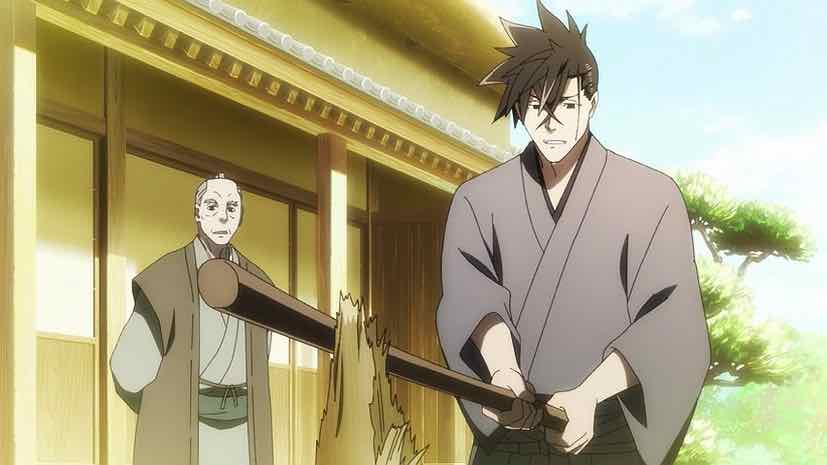 In doing my prep work for the 2022 Oscars post, I’m being reminded of something I pretty much already knew – 2022 was an awful year for original anime. There were an awful lot of them, but very few of them were any good I’m afraid. That’s been the trend in anime the past couple of years, with more originals being produced but with less originality. I would always be happy when a new series produces two first episodes as good as Revenger has, but I’m especially hopeful about this one because anime desperately needs a few good originals.
In doing my prep work for the 2022 Oscars post, I’m being reminded of something I pretty much already knew – 2022 was an awful year for original anime. There were an awful lot of them, but very few of them were any good I’m afraid. That’s been the trend in anime the past couple of years, with more originals being produced but with less originality. I would always be happy when a new series produces two first episodes as good as Revenger has, but I’m especially hopeful about this one because anime desperately needs a few good originals.
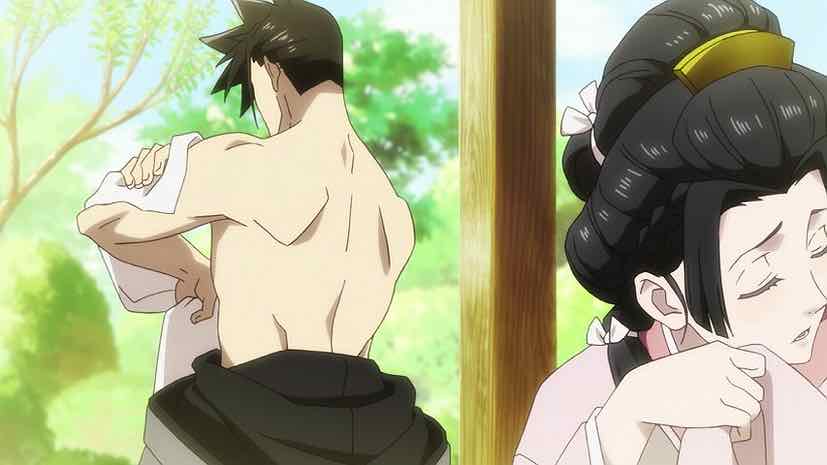 The huge caveat that is Urobuchi Gen certainly hangs over Revenger like a dark cloud on the horizon. But for all my concerns that his usual narrative drift will claim this show as yet another senseless Urobutcher victim, I can’t praise these two eps without praising him. It makes a difference having a polished, classically sound writer in charge, and even on his worst days Urobuchi is certainly that. There’s so much clarity in the writing here – everything that’s happening is logical and transparent without relying on clumsy exposition by explanation. It’s just a good, classic historical drama, even if it does seem to have a few flights of fancy to it.
The huge caveat that is Urobuchi Gen certainly hangs over Revenger like a dark cloud on the horizon. But for all my concerns that his usual narrative drift will claim this show as yet another senseless Urobutcher victim, I can’t praise these two eps without praising him. It makes a difference having a polished, classically sound writer in charge, and even on his worst days Urobuchi is certainly that. There’s so much clarity in the writing here – everything that’s happening is logical and transparent without relying on clumsy exposition by explanation. It’s just a good, classic historical drama, even if it does seem to have a few flights of fancy to it.
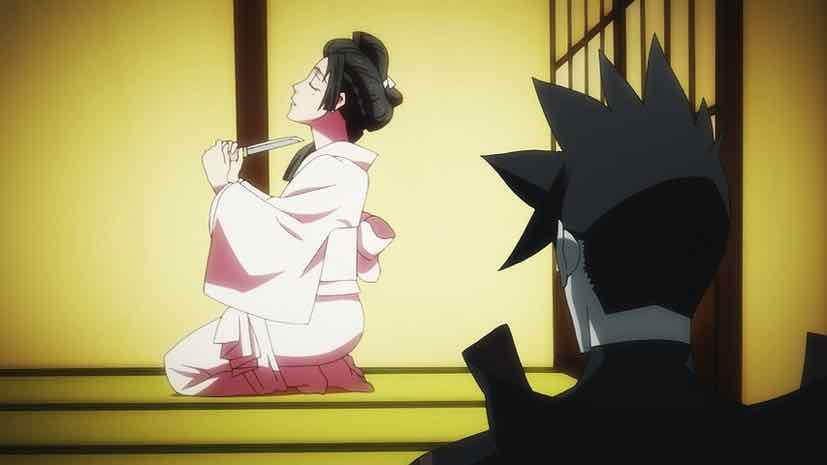 The first new twist is the introduction of the man apparently in charge of Usui’s operation, a seemingly European priest played by Ohtsuka Akio. There doesn’t exist a show that can’t be improved by casting him, and this is seemingly going to be an important role. The extend to which Usui and his band are all true believers is not absolutely clear, but there does seem to be some kind of bizarre Christian revenge doctrine behind the whole thing (though the money certainly doesn’t hurt). Usui’s decision to cut Raizou in on the take from the last job doesn’t go over well with Nio and Souji (Hayama Shouta) but Usui is clearly playing a long game where Raizou is concerned.
The first new twist is the introduction of the man apparently in charge of Usui’s operation, a seemingly European priest played by Ohtsuka Akio. There doesn’t exist a show that can’t be improved by casting him, and this is seemingly going to be an important role. The extend to which Usui and his band are all true believers is not absolutely clear, but there does seem to be some kind of bizarre Christian revenge doctrine behind the whole thing (though the money certainly doesn’t hurt). Usui’s decision to cut Raizou in on the take from the last job doesn’t go over well with Nio and Souji (Hayama Shouta) but Usui is clearly playing a long game where Raizou is concerned.
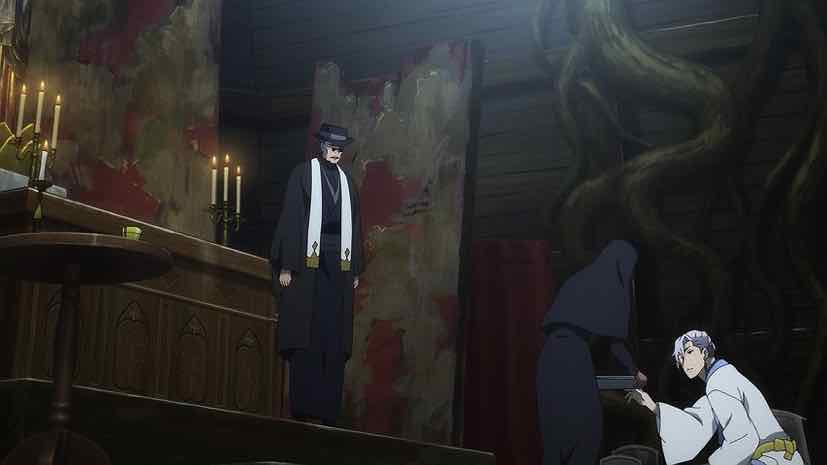 The system in use here is simple – whoever wants to hire the Revengers passes them a gold coin with bite marks in it, the depth of the marks communicating the strength of the grudge (or at least the teeth). That’s a rather poetical image it must be said, but Usui is pretty sanguine about the whole thing. Despite his interest in convincing Raizou to join, he refuses to deny that what he does is murder. He couches it in terms of being an instrument of those who desire justice and are unable to seek it themselves, but for a samurai like Raizou – even a fallen one – the idea of killing people for money over someone else’s grudge is reflexively abhorrent.
The system in use here is simple – whoever wants to hire the Revengers passes them a gold coin with bite marks in it, the depth of the marks communicating the strength of the grudge (or at least the teeth). That’s a rather poetical image it must be said, but Usui is pretty sanguine about the whole thing. Despite his interest in convincing Raizou to join, he refuses to deny that what he does is murder. He couches it in terms of being an instrument of those who desire justice and are unable to seek it themselves, but for a samurai like Raizou – even a fallen one – the idea of killing people for money over someone else’s grudge is reflexively abhorrent.
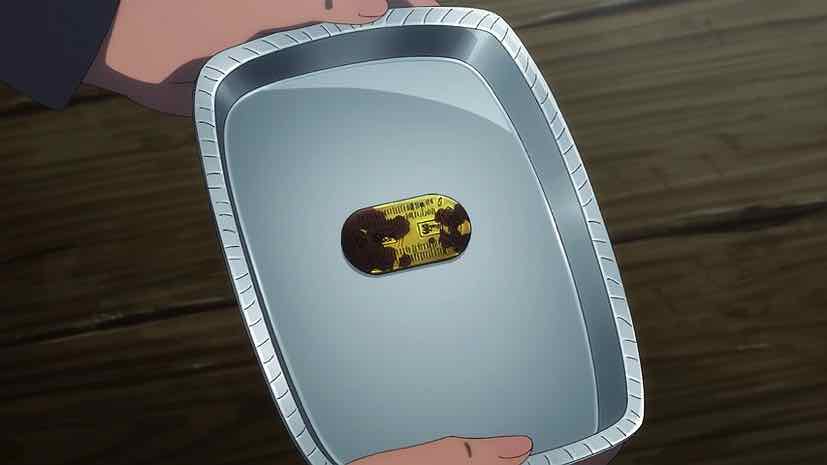 The someone in question this week is Mana (Sarah Emi Bridcutt), a dying courtesan who seeks revenge on the husband who cheated her out of her father’s dowry, Inohachi (Masuda Toshiki), and his employer and co-conspirator Tenmokuya (Sugino Tanuki). The go-between is Usui’s man Murakami Teppa (Takeuchi Shunsuke). He too has a day job, as a doctor, but “Riben-ji” is clearly his main gig. The question is whether Raizou will be a part of all this, but Usui presents his choice in stark terms – he can waste away to nothing in hiding and shame or he can put his sword to the service of “justice” (as Usui sees it).
The someone in question this week is Mana (Sarah Emi Bridcutt), a dying courtesan who seeks revenge on the husband who cheated her out of her father’s dowry, Inohachi (Masuda Toshiki), and his employer and co-conspirator Tenmokuya (Sugino Tanuki). The go-between is Usui’s man Murakami Teppa (Takeuchi Shunsuke). He too has a day job, as a doctor, but “Riben-ji” is clearly his main gig. The question is whether Raizou will be a part of all this, but Usui presents his choice in stark terms – he can waste away to nothing in hiding and shame or he can put his sword to the service of “justice” (as Usui sees it).
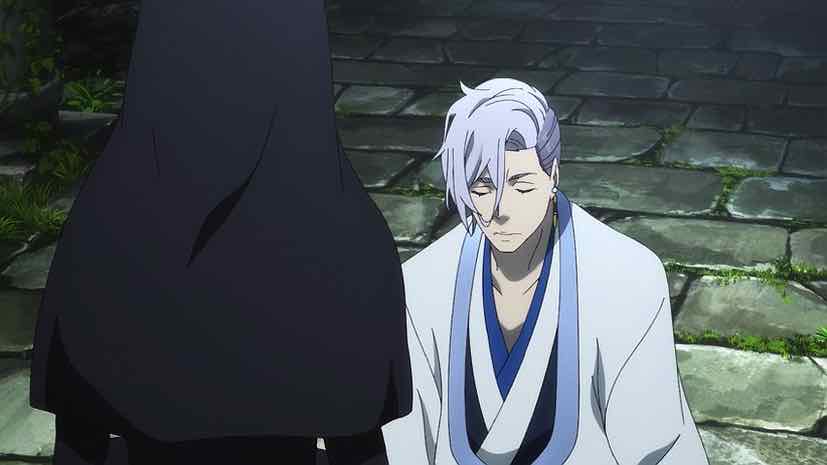 Even without Ohtsuka’s scenery-chewing priest’s involvement, this revenger gig is obviously morally dubious in a big way. Call it what you will – “vigilantism” probably comes as close as anything to the reality – it’s murder. It so happens the people we’ve seen killed so far have certainly been rotters, and Inohachi and Tenmokuya are no exception – conning young women out of their family savings and selling them into prostitution stamps their ticket to Hell to be sure. But you have to wonder just how careful the Riben-ji about making sure the client whose money they take is actually in the right before they kill for them.
Even without Ohtsuka’s scenery-chewing priest’s involvement, this revenger gig is obviously morally dubious in a big way. Call it what you will – “vigilantism” probably comes as close as anything to the reality – it’s murder. It so happens the people we’ve seen killed so far have certainly been rotters, and Inohachi and Tenmokuya are no exception – conning young women out of their family savings and selling them into prostitution stamps their ticket to Hell to be sure. But you have to wonder just how careful the Riben-ji about making sure the client whose money they take is actually in the right before they kill for them.
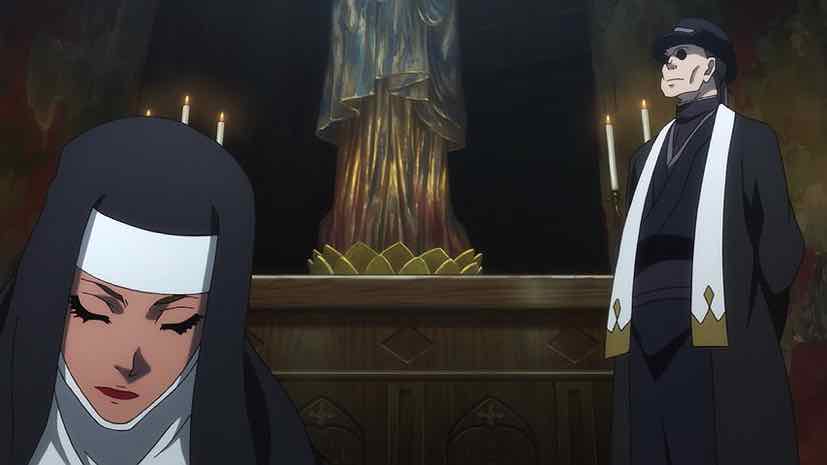 It’s Raizou who dispatches Inohachi with some help from Murakami (I’m guessing that style wouldn’t fly in Tsurune). As for Tenmokuya it’s Nio who lures him to his doom (if there were any doubt about Nio’s gender Tenmokuya’s particular perversion puts it to rest) at the hands of Usui. All this is done with a great sense of style and narrative punch – this world and this situation feels very real, and as flamboyant as they are so do the characters. It’s an excellent mix so far, thoroughly entertaining and artfully done – all we can hope is that history doesn’t repeat itself and the series has the legs for the full distance.
It’s Raizou who dispatches Inohachi with some help from Murakami (I’m guessing that style wouldn’t fly in Tsurune). As for Tenmokuya it’s Nio who lures him to his doom (if there were any doubt about Nio’s gender Tenmokuya’s particular perversion puts it to rest) at the hands of Usui. All this is done with a great sense of style and narrative punch – this world and this situation feels very real, and as flamboyant as they are so do the characters. It’s an excellent mix so far, thoroughly entertaining and artfully done – all we can hope is that history doesn’t repeat itself and the series has the legs for the full distance.


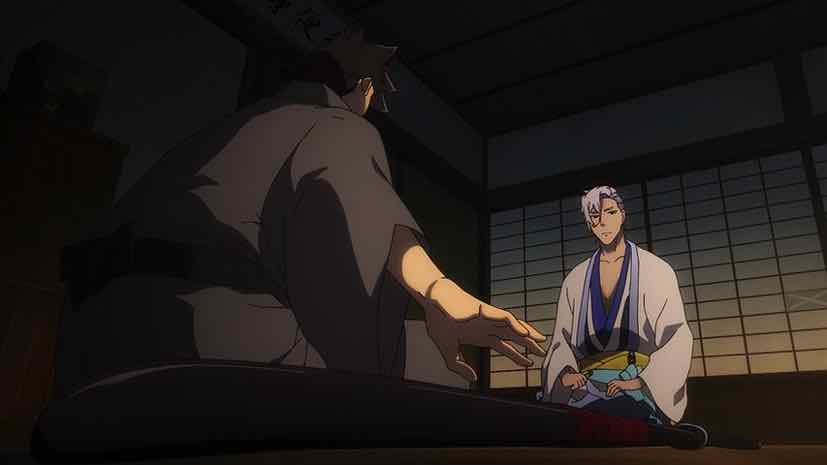
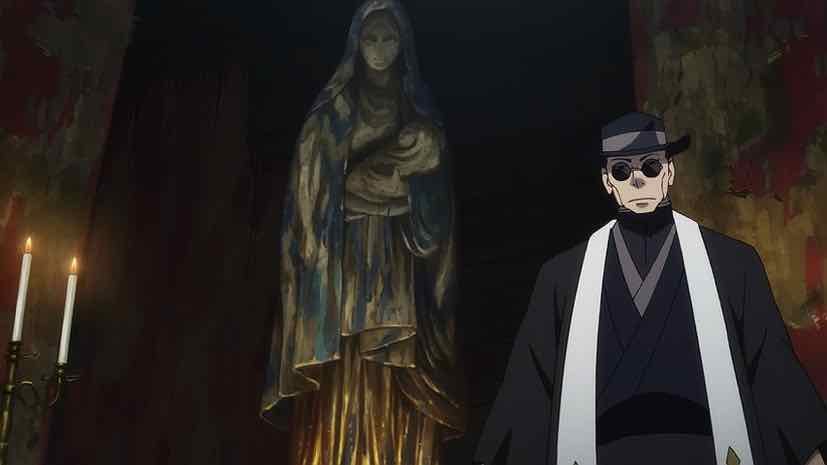
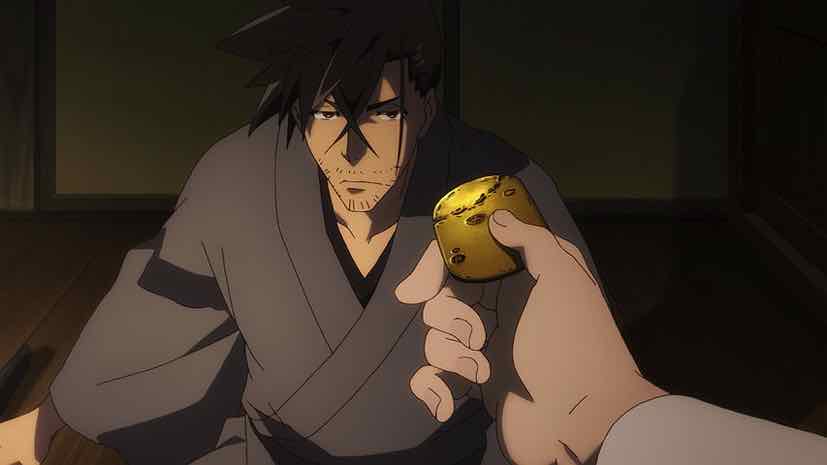
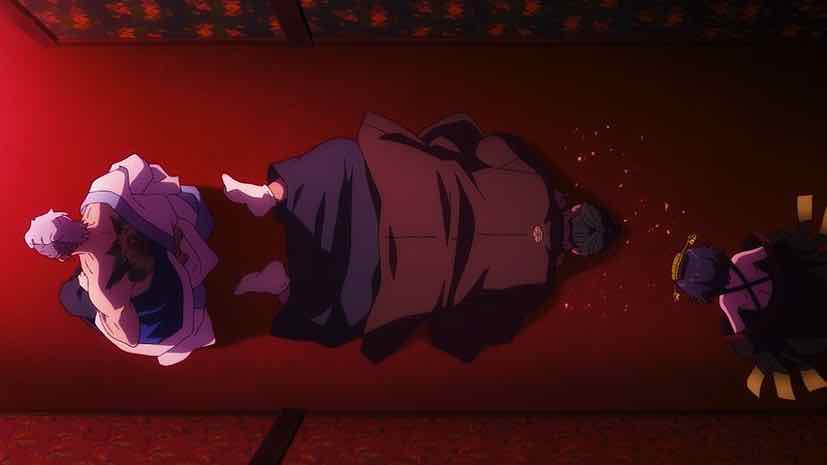
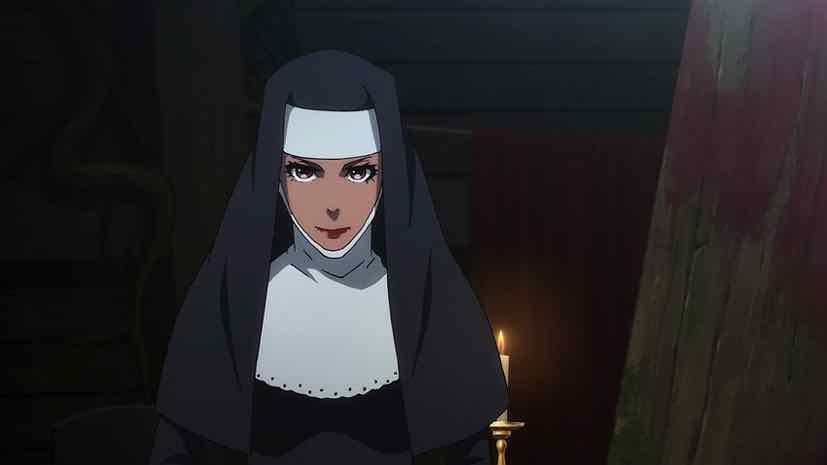
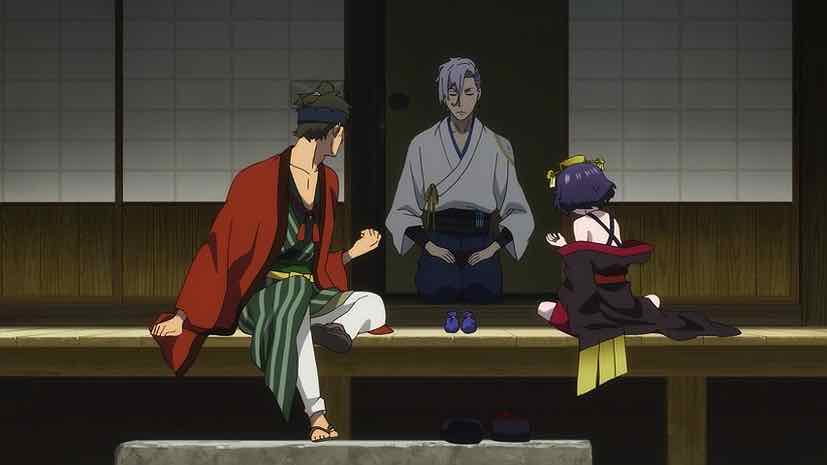

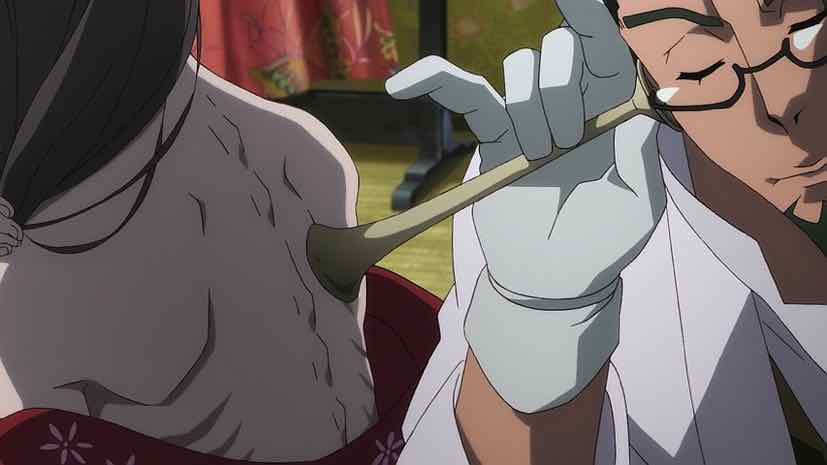
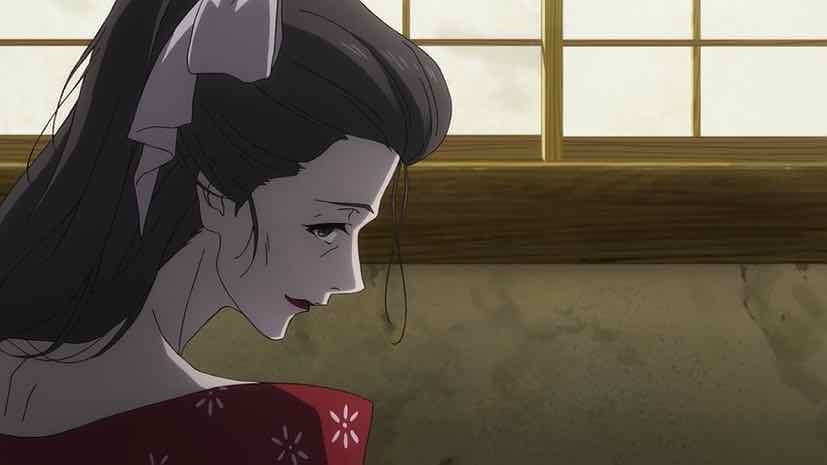
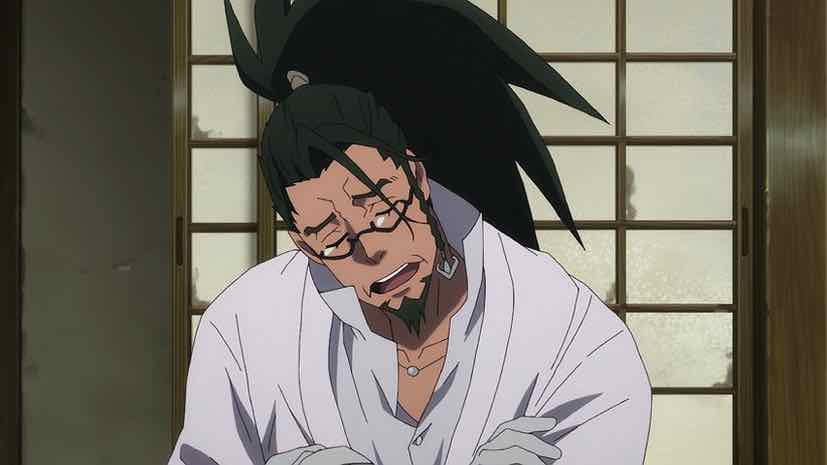
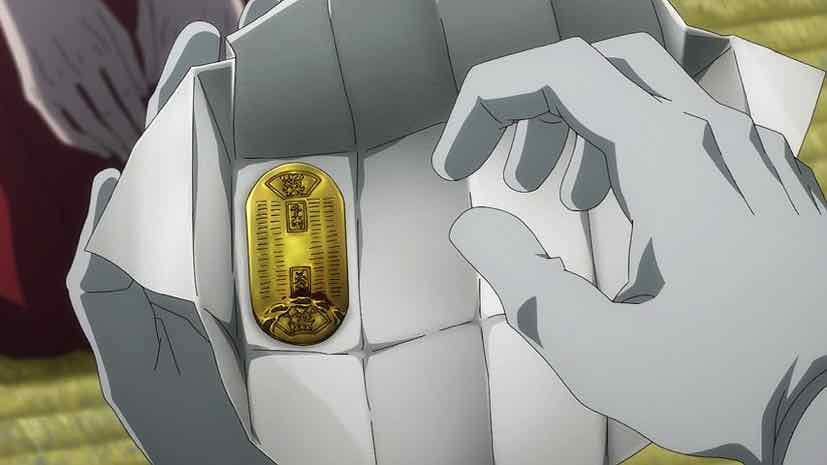
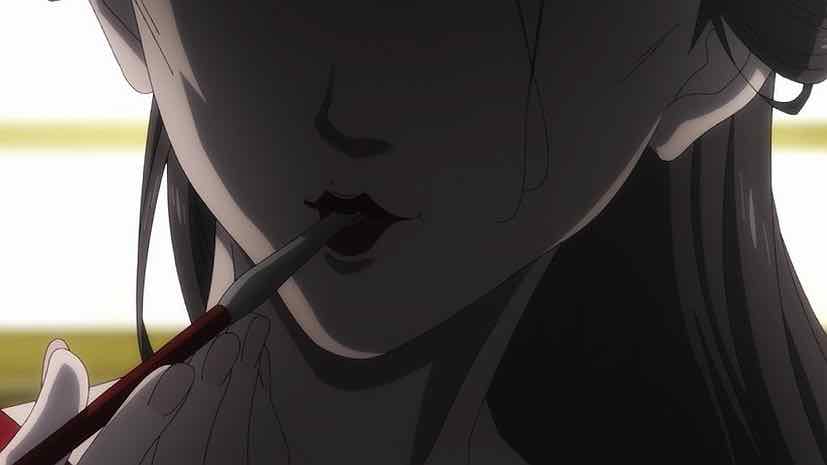
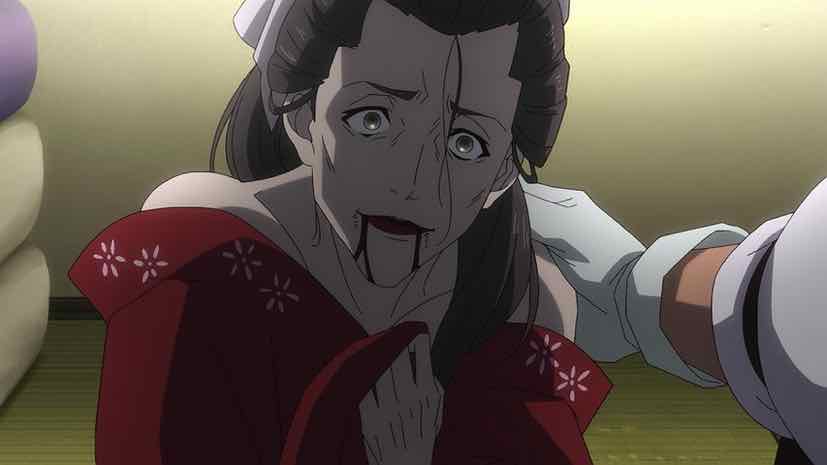
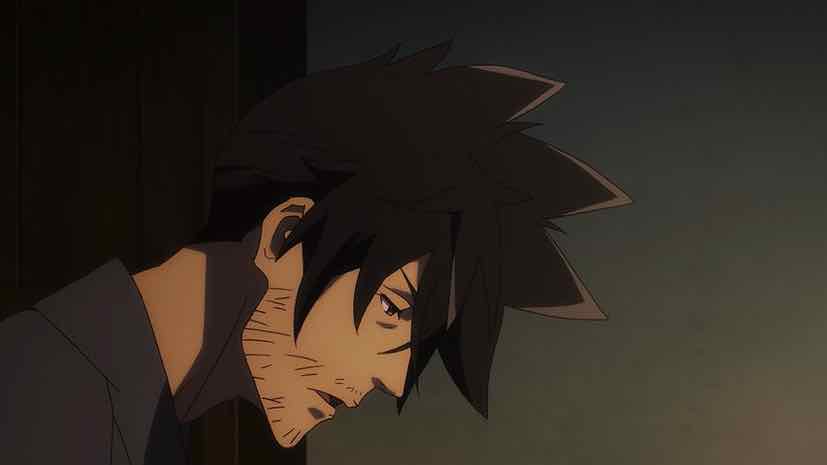
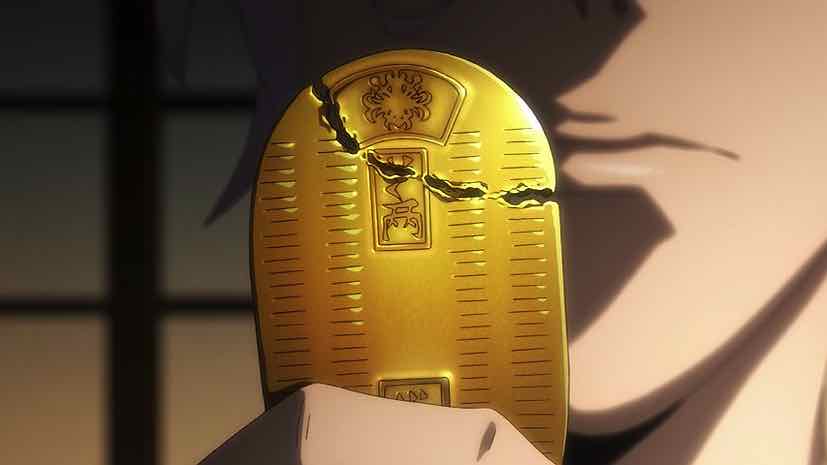


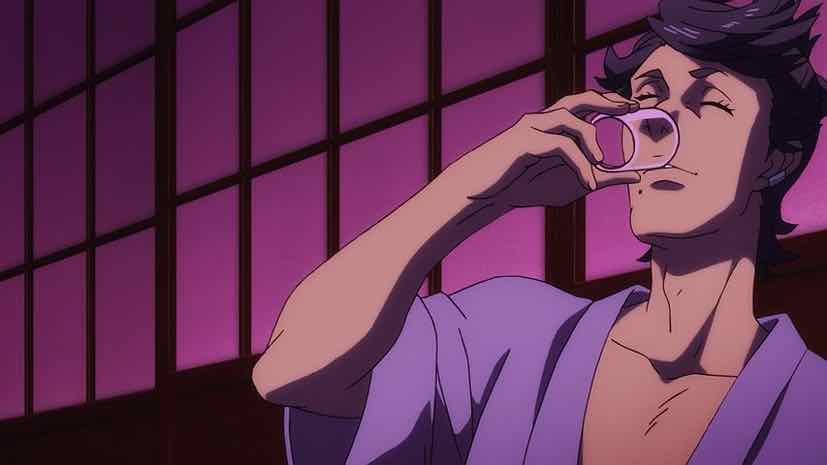
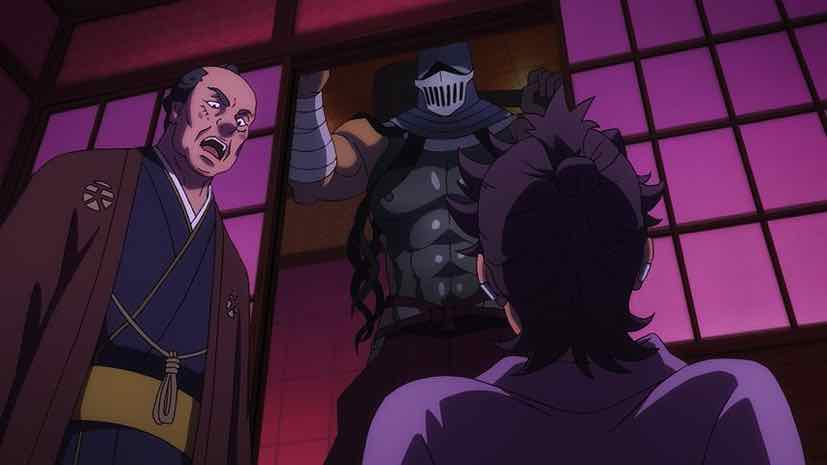
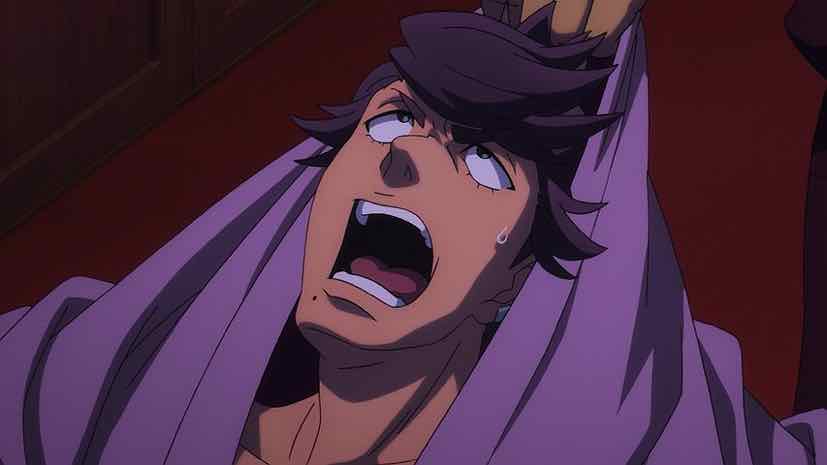
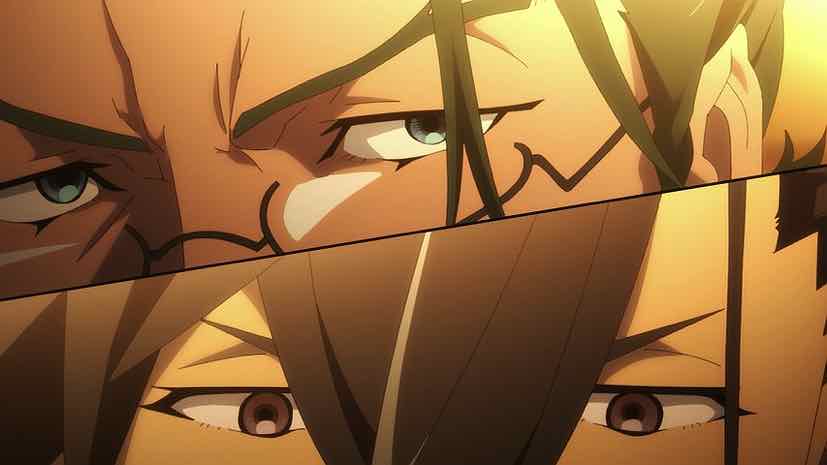
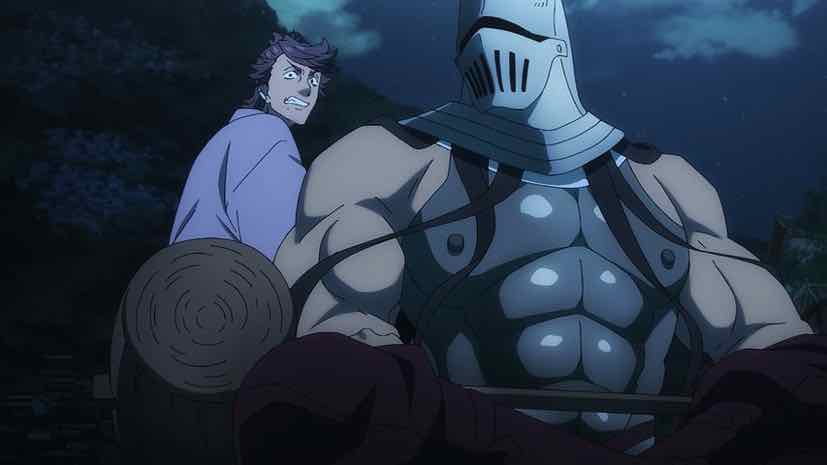
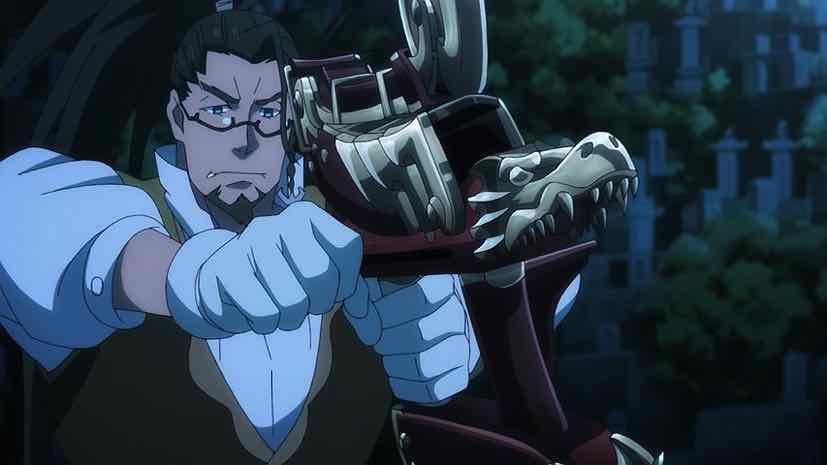
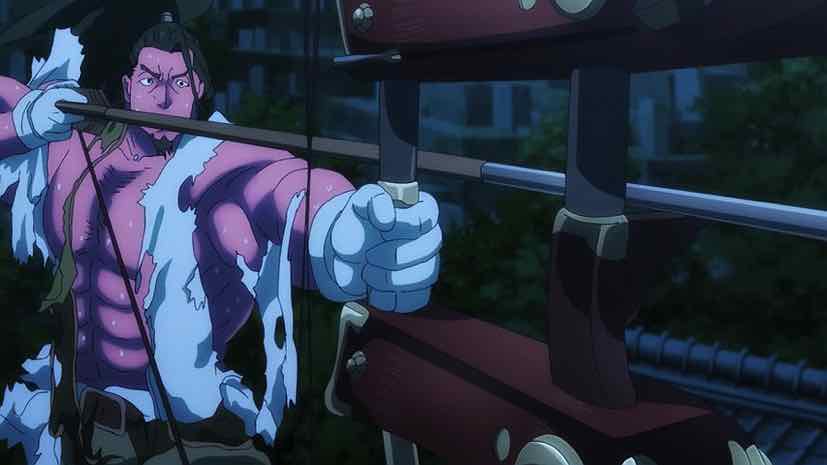
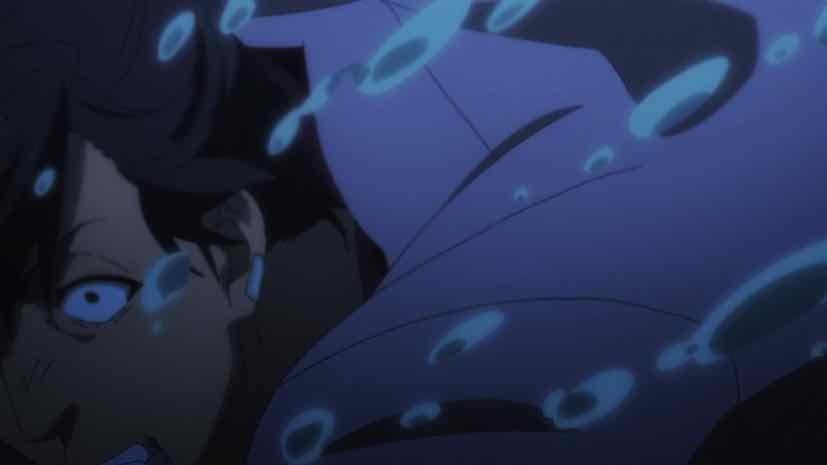

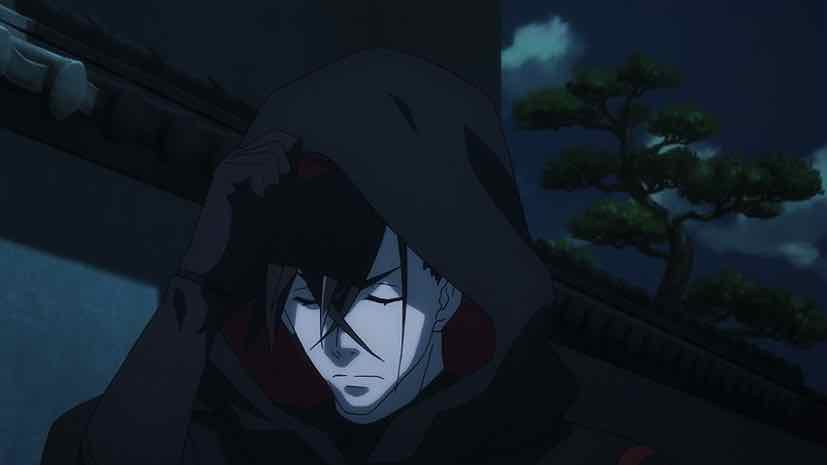
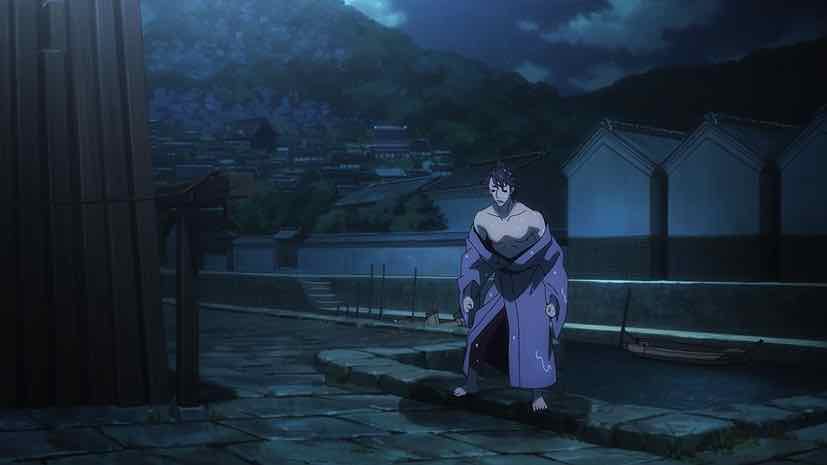


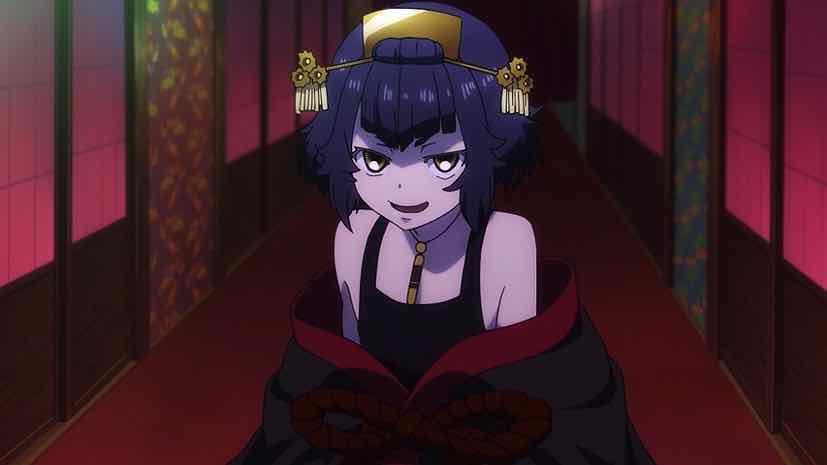
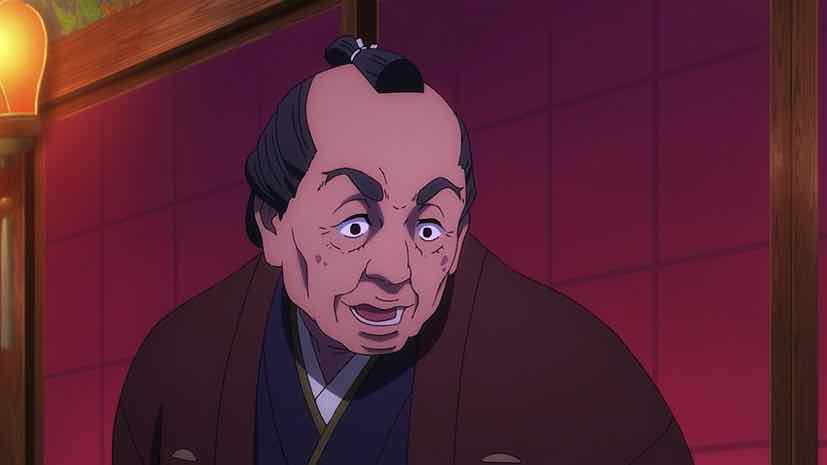

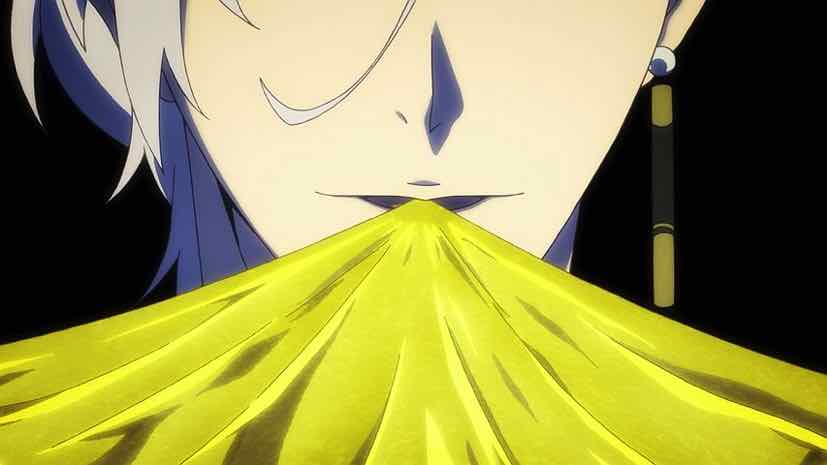
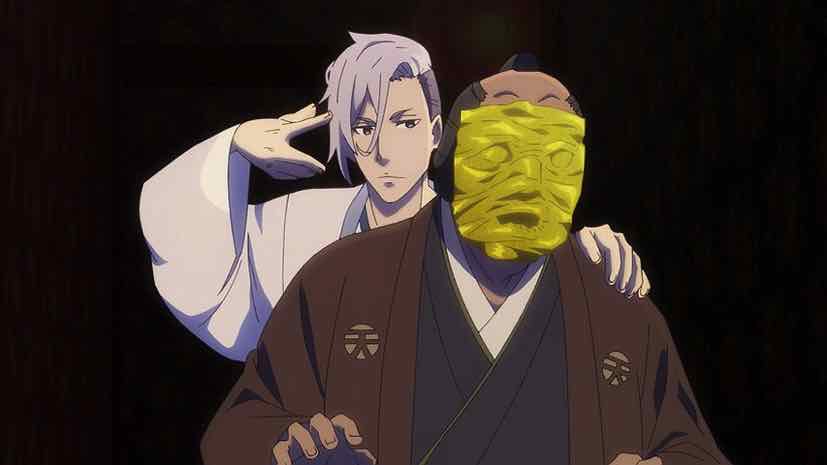

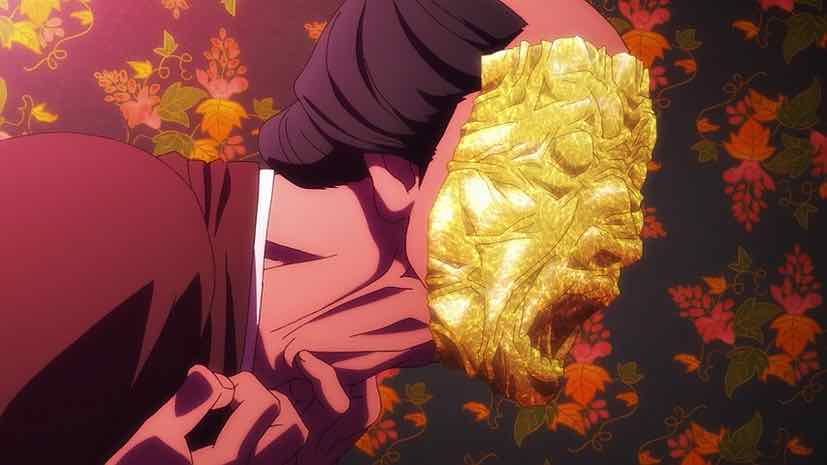
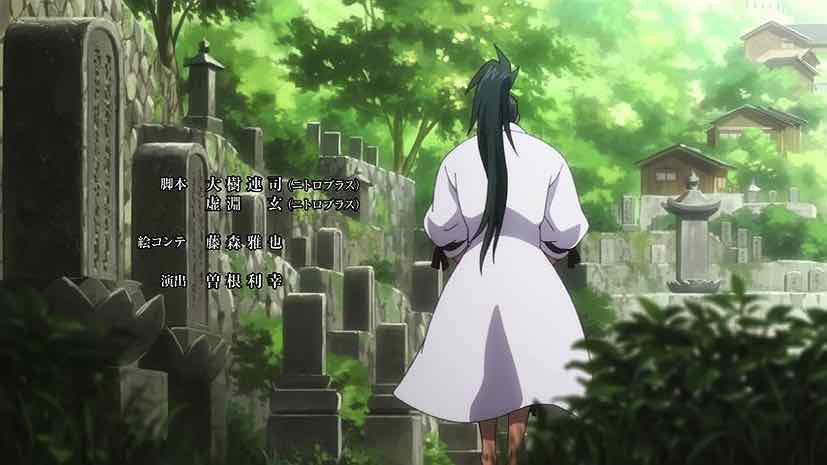

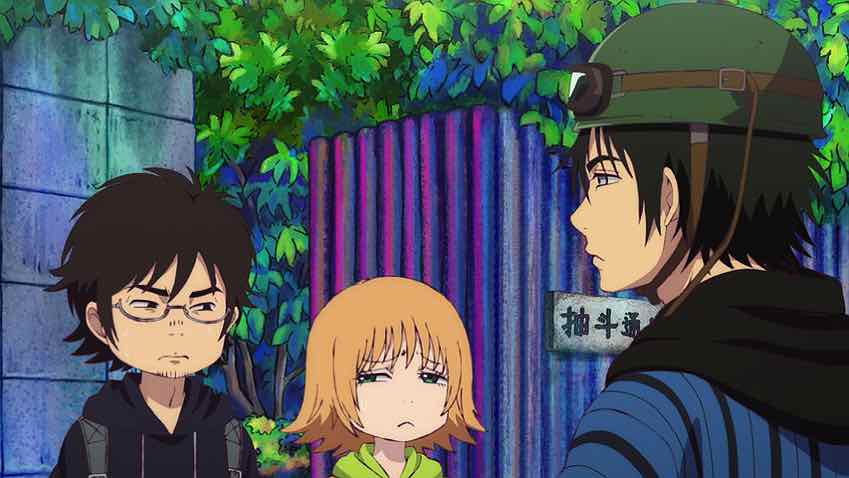
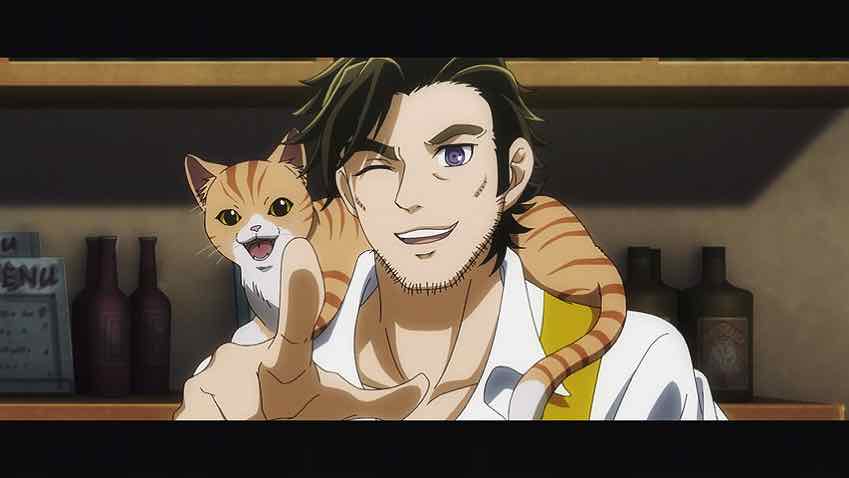
Joshua
January 14, 2023 at 1:28 amLast year, for every original series like DIY, Ryman’s Club, Lycoris Recoil (which oddly became the best-selling show of the year, beating out even idol series and gacha adaptations), there was guaranteed to be far more bad original series like Cue, Shine Post, Healer Girl, Prima Doll, Tribe Nine, Engage Kiss and Extreme Hearts which more often than not were transparently designed to be promos for new mixed-media franchises, which is exactly why they have so little originality despite being original series. That’s not getting into the original series that aren’t trying to lead into franchises, some of them unable to live up to expectations like Yurei Deco, Renai Flops, Vampire in the Garden and Bucchigire, and some of them that are flat out overrated (looking at you Akiba Maid War and Birdie Wing).
Revenger so far seems to be very promising as an original series. Very unsurprised that the fujos are all over Buddy Daddies, not impressed with High Card and Giant Beasts of Ars needs more time in the oven for me to commit to it.
Princess Usagi
January 14, 2023 at 10:34 amThat scene with Mana and the doctor was devastatingly beautiful. Butterfly patterns in kimono symbolize happiness, especially for the future of young women/girls. The way the camera lingered on her butterfly kimono deeply struck me with the happiness she and her family hoped for her future and subsequently, how searingly painful the shattering of those dreams. Then, there’s the stark contrast of the gorgeous kimono giving an image of beauty and youth with Mana, bruised, broken, and at death’s door. Not to mention that her kimono and naga-jyuban (under-robe) were both scarlet, associated with good fortune- all the while she was living in such a horrible, unfortunate situation. I was impressed with how, in one simple scene, they poetically drove home the deep chasm between her expectations and reality and elicited outrage for how she was victimized. It made me want to side with the Revengers as “the good guys” for disposing of shitty people. But, like you mentioned, do they actually pick sides in fighting for the common good or do they go where the money leads, no questions asked…
SeijiSensei
January 14, 2023 at 10:14 pmI read a posting recently that compared this show with Sarai-ya Goyou (“House of Five Leaves”) without any detail. At first I thought the comparison was mostly stylistic, but reading this review made me aware of the similarities between Masa-san and Raizou. Both have the opportunity to employ their samurai training in the service of a criminal activity. In Masa’s case it’s a bit harder to rationalize their crimes; they’re kidnappers by trade. Yet both men are faced with renouncing their samurai commitments in favor of survival.
Guardian Enzo
January 14, 2023 at 10:21 pmInteresting comparison that hadn’t occurred to me.
Nicc
January 15, 2023 at 7:20 amThe 2nd episode gets into some world building and shows how the group finds their work and their purpose for it. But, first it’s time for everybody to get paid and Usui receives payment from a priest. Raizou gets a cut, even if he isn’t part of the team at that time. Speaking of him, he’s still reflecting on what to do now as a ronin.
This week’s featured character is the team doc, Murakami. He’s the one who picks up a new job while treating a patient who is clearly at the end of the rope. That’s when we learn about the gold coin.
I didn’t think we’d get the title drop this early, but Ususi clearly calls themselves as “Revengers”, transitioning directly to the eye catch. The episode title is “Gold Opens Any Door” and so you are correct about just how much vetting takes place or if they’ll take any job is the gold coin is good.
We haven’t had the whole team fight together yet so far (Doc sat out the previous one to watch over Raizou. In this mission, Souji is presumably busy with gambling), but the mission is simple enough anyways. It looks the Doc is a fan of archery and armed with a compound bow that is too modern for the setting and hits with the power of a 20mm cannon, but Rule of Cool works here. The two targets go down quickly and it’s off to the next episode. Based on the title of the next episode, I wonder if the next episode is about Souji as we learned that he enjoys gambling.
stephen
January 15, 2023 at 8:47 pmthis winter is shaping to be much better than I thought. at least three shows I would be watching, ‘vinland saga’,’hikari no ou’ and ‘revenger’. the latter thanks to your suggestion. we will probably know in the next couple of episode whether the interesting premise and sharp story-telling will translate to a great show. what i find most interesting of the show so far and hopefully they will explore more is the culture and history of revenge in japan as shown by the play on word with “ben-ri”.
Guardian Enzo
January 15, 2023 at 9:43 pmYeah, it does seem as if the season has a chance to exceed what were admittedly pretty low expectations. We’ll know a lot more in the next couple of weeks.
DonkeyWan
January 15, 2023 at 8:57 pmThere are weaknesses to teh show, particularly the gimmicks around shoes, the kite and the archery etc. The characters are also a bit tropey and it would have been better to have more normal looking revengers I feel. But the writing and dialogue are good and there is some potential in the story. I just hope it doesn’t become lots of silly action scenes.
Shotgun Tsubame
January 16, 2023 at 2:58 amFirst thoughts when watching E1: the series is a throwback/homage to the old jidaigeki Hissatsu Shigotonin TV series from the 1970s and the other TV dramas of that ilk, all of which utilize this same formula of assassin group/vigilante group/mercenary group being paid taking on jobs/dispensing a certain kind of justice for people who aren’t able to do so. The timeframe that Revenger is set in, that’s spot on as well, since the jidaigeki genre is generally set around the mid/late 1600s to the early/mid 1800s as a very rough timeline. The over-the-top ‘gimmicks’ utilized are typical of the old TV dramas where each member of the team has a day job that is (somewhat) related to their special (often fantastical) methods of assassination. E2 just confirms those first impressions. There are some specific instances where I’m almost *sure* the writers were giving a nod to specific characters, either in the Hissatsu series or from one or two other famous period samurai shows (not going to mention them for brevity’s sake). It’s going to be interesting to watch how it develops, but I’m absolutely delighted to see a Hissatsu-style series translated into anime for now. The special killing methods, as exaggerated and dramatic as they are, really work well in animation.
Guardian Enzo
January 16, 2023 at 6:59 amI can truthfully say I have almost no knowledge of that genre, so thanks for sharing that insight.
What’s Nio’s day job then, ROFL.
Shotgun Tsubame
January 18, 2023 at 11:51 pmNio? Well, if we’re going to go by the various types of jobs that HAVE appeared in previous Shigotonin-style series, they might actually be a kite-maker or even someone who makes cords (like the ones for kumihimo; Masaki Kyomoto was actually famous for playing a kumihimo braid/cordmaker named Ryu in the Hissatsu series) or even specialty kite-strings. That thing about putting ground glass on the kite string is actually not uncommon; village children in certain parts of Southeast Asia do it and have ‘kite battles’ where the winner is the one that can cut the string of his opponent’s kite. Nio might also help Usui in the lacquerware decoration business; there are lacquer techniques that utilize wire inlay.